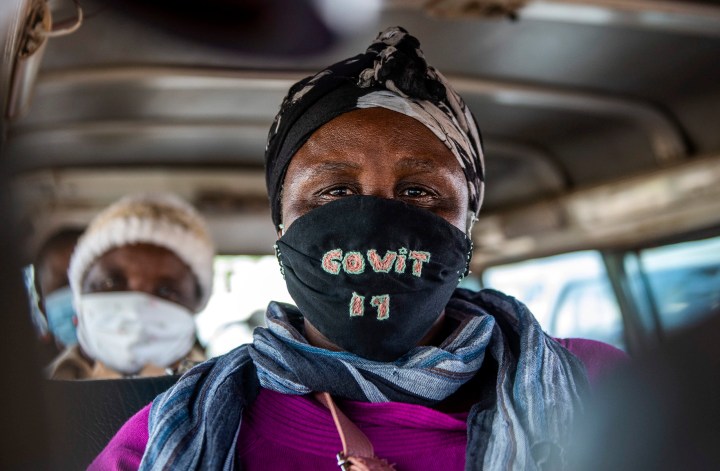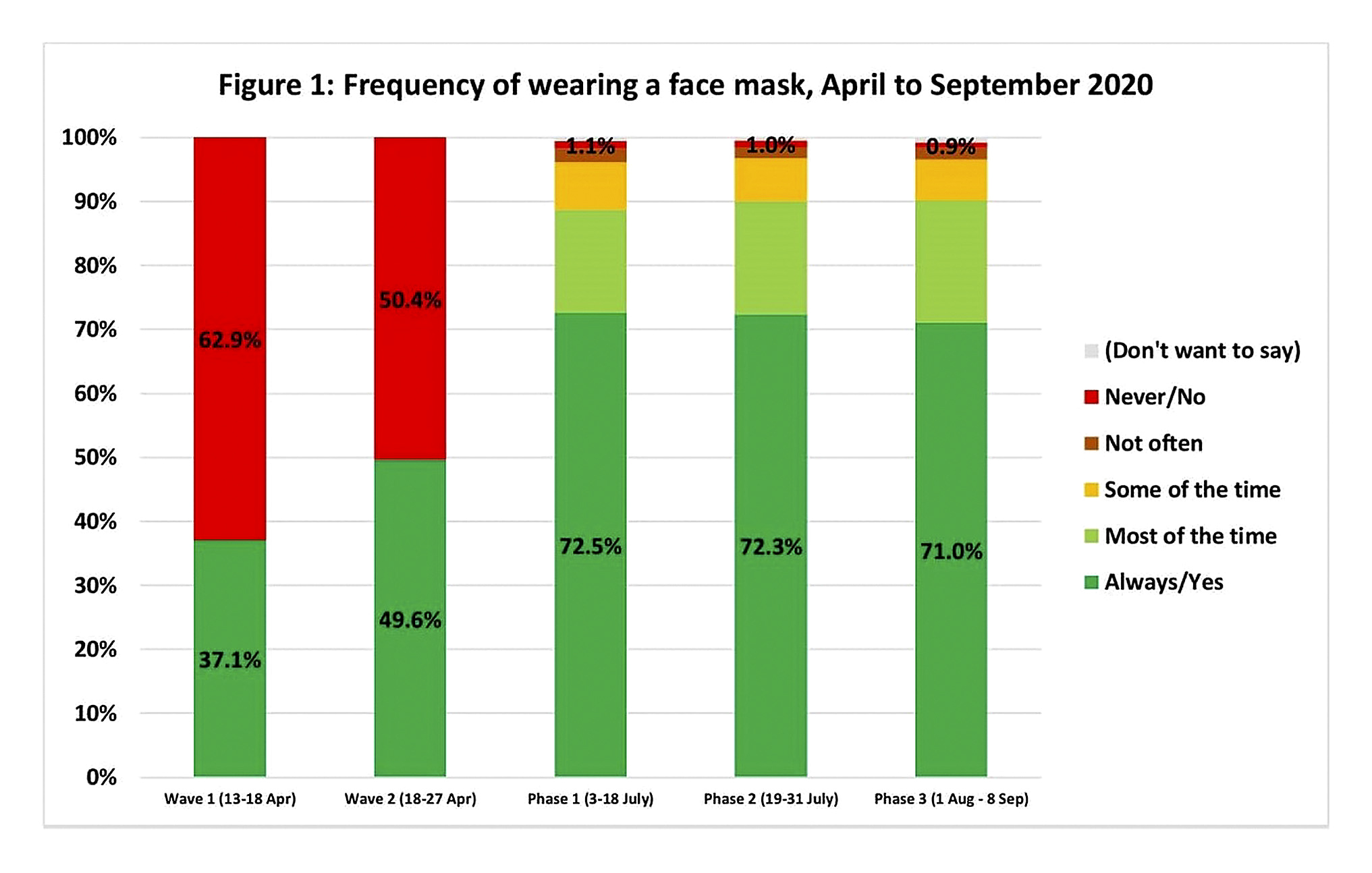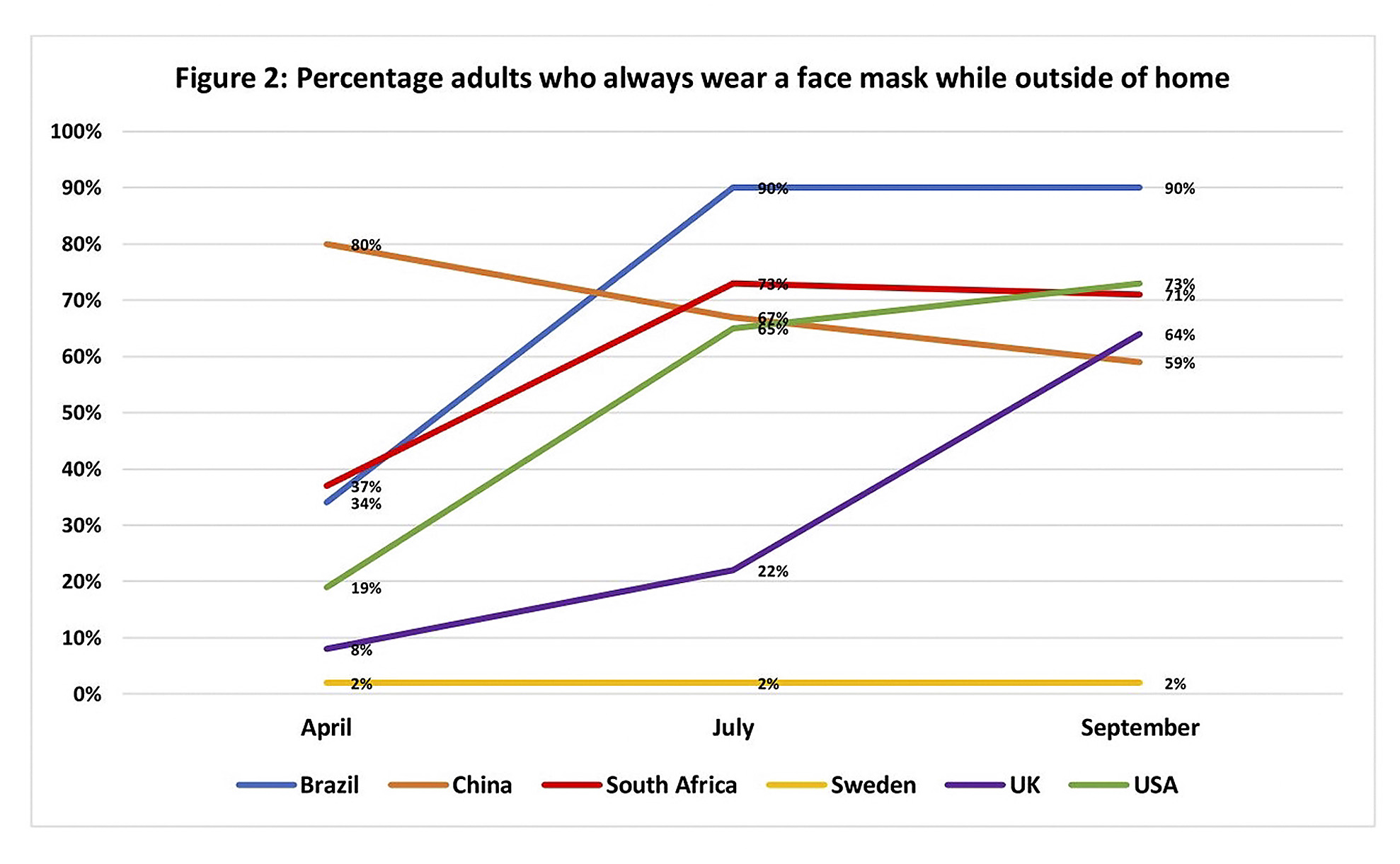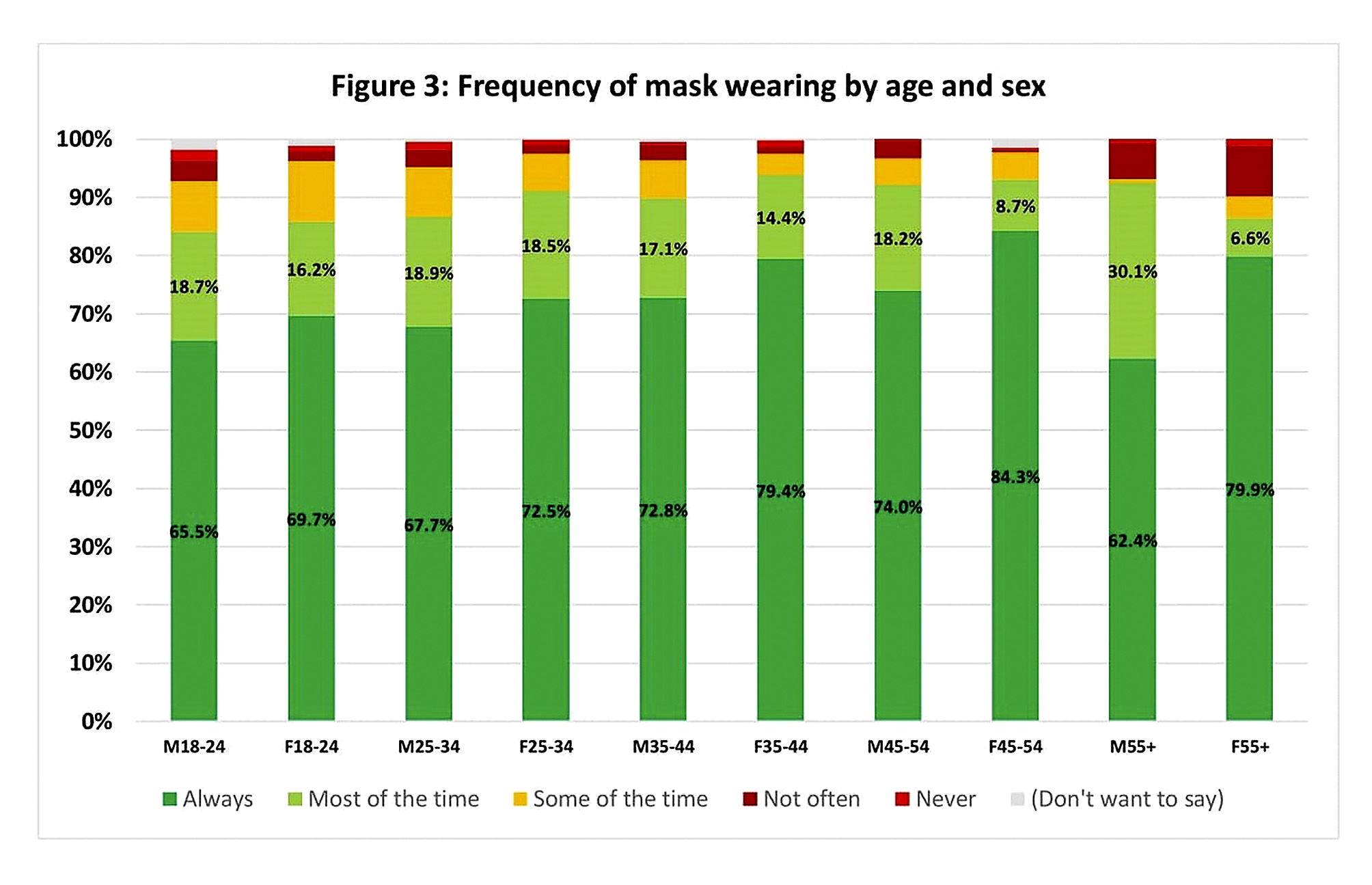Maverick Citizen Op-Ed
Surveys show one in three adults in South Africa does not wear a mask when leaving home

Almost a third of adults in South Africa do not wear a face mask every time they leave home, despite public consensus and scientific evidence to be broadly converging around the practice of wearing a face mask in public places as an effective measure to reduce the spread of the virus.
The University of Johannesburg and Human Sciences Research Council Covid-19 democracy survey conducted from April to September asked respondents whether, and how regularly, they wear a face mask when leaving their homes. Full compliance was low (37%) early in April during the initial weeks of lockdown level 5. It increased to 50% of adults by the end of April. The practice peaked and stabilised at just over 70% in July, August and September. Among the other 30% of adults, 20% said that they wear a mask “most of the time” and about 7%, “some of the time”. Only 2% revealed that they never (or not often) wear a mask and 1% did not want to say.
 According to the online Imperial College London Survey, these statistics compare favourably with those collected during the same period in China (59%), the UK (64%), United States (73%) and Brazil (90%). Conversely, the proportion was 12% or lower in all Scandinavian countries, with only 2% in Sweden always wearing a face mask when in a public place.
According to the online Imperial College London Survey, these statistics compare favourably with those collected during the same period in China (59%), the UK (64%), United States (73%) and Brazil (90%). Conversely, the proportion was 12% or lower in all Scandinavian countries, with only 2% in Sweden always wearing a face mask when in a public place.

While it is widely accepted that masks are not particularly fun to wear, and in spite of limited evidence to the contrary, guidelines issued by the Centers for Disease Control (CDC) and Prevention and the World Health Organisation, indicate that “masks help prevent people who have Covid-19 from spreading the virus to others”.
They base this on scientific evidence that masks serve to reduce the spray of droplets from coughing, sneezing or raised voices when worn over the nose and mouth. In June, the US Institute of Health Metrics and Evaluation forecast that provided that 95% of people wore masks, the number of deaths from Covid-19 could be substantially reduced. Another simulation suggested that even if 80% of the population wore masks, it would reduce the transmission of Covid-19 more than a strict lockdown.
The UJ/HSRC survey shows that the wearing of masks outside of the home is higher among females than males across all age groups. Compliance generally increases with age among both males and females. Almost two-thirds (66%) of young men in the 18-24 year category say they always wear a mask when outside of their homes, as do 70% of females in the same age category. This increases to 68% for males aged 25-34, 73% for males aged 35-44 and 74% for males aged 45-54 years. Similarly, compliance is lower (70%) for women aged 18-24 than for their older counterparts of 25-34 (73%), 35-44 (79%) and 45-54 (84%). An exception is males aged 55 years or older (62%), the lowest overall, and much lower than their female counterparts aged 55 years or older (80%).

Research in the US early in the lockdown showed a similar gender disparity in mask wearing. Whereas less than a third (29%) of men said they always wore a mask or cloth covering over their faces, the proportion was 44% among women. The practice has required a drastic change in everyday behaviour and other research attributes the gender disparities to a “masculine” perception that masks make men look weak or fragile.
A Gallup Panel Survey during June in several states of the US reported that 42% of the 18-34 and 35-54 year age groups always wore a mask when outside their homes. The same study found that respondents aged 55 years were more compliant, at the 47% level. Among older adults (aged 65-plus) in the US, classified as a high-risk population by the CDC, 74% said that they always wore masks in shops (in contrast to the UJ/HSRC survey finding about older males). The proportion was only 66% among those aged 50-64, 61% of the 30-49 group and 62% of the 18-29 group. Research in Germany revealed that young people who are studying (aged less than 25) were motivated to wear masks to avoid being “judged”, whereas for people aged over 25, protecting others was a significant motive.
However, among the messages to the president collected in the UJ/HSRC survey, the effectiveness of masks was queried: “Put scientists and doctors in a laboratory to try to find cure for Coronavirus and stop telling us to wear mask without trying to bring solutions” (Black African man, North West, degree/diploma, 35-44 years).
Another respondent complained about the poor quality of some masks: “Ukunikezelwa kwawo wonke umuntu ama-masks asemgangathweni ngoba izinto zokuphepha mazikhandwa zidlula eSABS njengamanje umazenzele nje akunala kuqinisekiswa khona I quality lama masks nama sanitisers. Manje lokho kukodwa nje kusenza isifo sibhebhetheke khona ngi sanitizile noma ngifake imask” (Black African man, KwaZulu-Natal, degree/diploma, 35-44 years: Everyone needs to get masks that are safe and meet SABS standards because, right now, everyone is just manufacturing and producing masks and sanitisers and some of them do not meet the safety standards. That on its own continues to spread the virus regardless of whether I have sanitised or worn a mask).
Another urged the president to discontinue the mask-wearing requirement: “Maak als oop, verwyder die lockdown en die masker gedra” (White woman, Mpumalanga, some secondary schooling, 35-44 years: Open everything, remove the lockdown and mask wearing).
Others were concerned about mask-wearing compliance among some sectors of the public.
One respondent commented: “Ever since the country went on to level 3, police are not visible enough. People are not taking this thing of wearing a mask seriously. There should be a law that police must charge those people who do not wear mask” (Black African woman, KwaZulu-Natal, degree/diploma, 45-54 years).
Another commented: “As I’m doing this I’m in a taxi and someone has no mask on them and they are talking a lot, what must we do? Can Minister [of Transport, Fikile] Mbalula put some pressure on the taxi [drivers/owners] otherwise we will die” (Black African man, Gauteng, matriculated, 35-44 years).
The UJ/HSRC study found that employed people (79%) and people who had completed higher education (81%) were significantly more likely to say they wear masks always, than were their counterparts who are unemployed or have completed lower levels of education.
New regulations require an employer who employs more than 50 employees to submit a record of its risk assessment, as well as a Covid-19 health and safety policy, to the Department of Employment and Labour by Thursday 22 October. Guidelines to workers are to wear masks at all times when commuting to work and when at the workplace.
The UJ/HSRC survey found that 79% of full-time employees always wear a mask, as do 75% of the part-time employed. The proportion was 72% for those who are self-employed or working piece-jobs, 70% among unemployed people, job seekers and students, and 69% of labour inactive individuals. Interestingly there is not a direct link with the affordability of a face mask. People in the monthly income category of R2,501 to R5,000 were most likely (83%) to say that they always wear a face mask in public. This exceeds the proportions of the highest income group (R20,000+) at 81% and the lowest income group (R1,000 or less) at 72%.

Asked what the best thing about the lockdown has been, several respondents were positive about mask-wearing. One expressed pleasure that mask-wearing is compulsory: “Almal word verplig om gesigsmaskers te dra” (Coloured woman, Eastern Cape, degree/diploma, 55-64 years: Everyone is compelled to wear a face mask). Another liked the safety aspect: “Wearing a mask and social distancing keep you safe” (Black African man, North West, matriculated, 35-44 years). Another was pleased about the reduced incidence of influenza: “Wearing a mask when going out for shopping is a nice practice. Flu was never [an issue] during this lockdown” (Black African woman, Limpopo, degree/diploma, 55-64 years).
For others, people not wearing masks was mentioned as the “worst thing about lockdown”, such as when “people not following the instructions of Covid-19, and others not even wearing a face mask in public” (Black African man, Limpopo, matriculated, 18-24 years) or the situation of “Pub patrons not wearing a mask” (White man, Eastern Cape, matriculated, 45-54 years).
The hazard of public transport was highlighted by several respondents, for example: “The worst thing that has happened to me during the lockdown is getting into a taxi while the driver and other passengers [were] not wearing face masks” (Black African man, Gauteng, matriculated, 18-24 years).
Conversely, several respondents said that actually wearing a mask was the “worst thing” about the lockdown. One complained that: “Wearing a mask … suffocates [you] and shortens your breath” (Black African woman, Gauteng, degree/diploma, 18-24 years). Another said: “Wearing a mask is really unbearable, we can’t breathe” (Black African woman, Gauteng, matriculated, 18-24 years). Some also worried about children having to wear masks continually at school; “Die skool kinders wat gedurig met maskers moet sit” (Coloured woman, Western Cape, some secondary schooling, 25-34 years). One objected to “suffocating while shopping because of masks” (White man, Gauteng, degree/diploma, 45-54 years).
After seven months of lockdown, public consensus and scientific evidence appear to be broadly converging around the practice of wearing a face mask in public places as an effective measure to reduce the spread of the virus. DM/MC
Stephen Rule is a Research Director in the Developmental, Capable and Ethical State (DCES) research division at the Human Sciences Research Council. Kelebohile Afrika is an MA-candidate at the Centre for Social Change at the University of Johannesburg. Ngqapheli Mchunu is a PhD intern in the DCES research division at the HSRC. Samela Mtyingizane is a PhD intern in the DCES research division at the HSRC.
Round 2 data were collected from 7,966 adult respondents during the months July to September in the online multilingual UJ/HSRC Covid-19 Democracy Lockdown Survey. The survey was administered using the #datafree Moya Messenger App on the #datafree biNu platform. Results are weighted by age, population group and education, making them broadly indicative of the attitudes and behaviour of the population.
"Information pertaining to Covid-19, vaccines, how to control the spread of the virus and potential treatments is ever-changing. Under the South African Disaster Management Act Regulation 11(5)(c) it is prohibited to publish information through any medium with the intention to deceive people on government measures to address COVID-19. We are therefore disabling the comment section on this article in order to protect both the commenting member and ourselves from potential liability. Should you have additional information that you think we should know, please email [email protected]"




 Become an Insider
Become an Insider